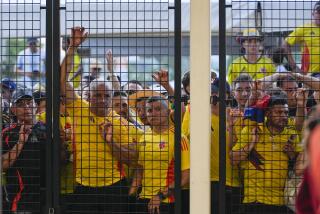Gunmen Kill Soccer Player in Colombia
- Share via
BOGOTA, Colombia — Angry at Colombia’s elimination from the World Cup soccer tournament, gunmen Saturday shot and killed Andres Escobar, the player who accidentally scored a goal against his own side in a match with the United States and helped seal the team’s fate, police said.
Escobar, 27, was shot to death outside a restaurant in Medellin barely 48 hours after returning home from Los Angeles, where Colombia fell 2-1 to the United States on June 22.
The unidentified gunmen confronted Escobar around 3 a.m., and one said, “Thanks for the auto-goal,” a witness told local radio stations. Then, the men opened fire, shooting Escobar 12 times as the group shouted “goal” after each shot. The gunmen then fled in two vehicles.
Drug traffickers reportedly lost millions of dollars in bets on the Colombian team, which went into the World Cup a favorite but performed miserably. Police said they suspected disgruntled bettors may have ordered Escobar’s murder.
One group of bettors is said to have lost $10 million on Colombia’s upset loss to the U.S. team, and an anonymous group called the television news program QAP last week threatening revenge.
The Colombian team also received death threats during the World Cup, forcing Coach Francisco Maturana to change his lineup minutes before the U.S. match at the Rose Bowl last month.
“This is a loss that plunges Colombia into mourning and fills us with pain,” President Cesar Gaviria said in a nationally broadcast address.
Authorities announced a reward of more than $60,000 for information leading to the capture of the killers. Additional bodyguards were assigned to each member of the Colombian team. Because of the threats, players already had protection, but it was not known if Escobar’s guards had accompanied him to the restaurant where he was slain.
Two suspects, including the alleged driver of one of the getaway cars, were arrested later Saturday.
The young defenseman’s body lay Saturday in the sports coliseum of Medellin, his hometown city 150 miles northwest of Bogota, and a funeral was scheduled for today. Escobar was to marry in December.
Hundreds of mourners crowded the stadium while police set up barricades in an effort to trap Escobar’s killers.
The subdued crowd filed past Escobar’s open casket, flanked by dozens of bright bouquets and a dozen police standing at attention, and gazed at Escobar’s pale face under his mop of dark, curly hair.
“Justice!” someone in the crowd shouted.
Colombian soccer has long been connected to drug traffickers. Pablo Escobar, the most ruthless of the cocaine barons until his death in a shootout with police last December, was a major contributor to Medellin’s professional team, Atletico Nacional, for which Andres Escobar played. The two Escobars were not related.
In a country accustomed to brutal drug wars that have claimed the lives of presidential candidates, journalists and hundreds of innocents watching from the sidelines, Colombians were nevertheless shocked by Escobar’s murder.
The national team, none of whose members is believed to have direct links to drug trafficking, was considered by experts to have a shot at winning the World Cup, thanks in part to its grace and precise style. And players had expressed hope in interviews before the tournament that their athletic virtuosity would cleanse Colombia’s image and win honor for it on the international stage.
“Soccer is only a game, and there is no justification for Andres to have been killed for having committed an auto-goal,” Coach Maturana said.
From Dallas, headquarters of the World Cup, Andreas Herren, spokesman for soccer’s international governing body, FIFA, said, “Everybody at FIFA is deeply shocked.”
Escobar’s mistake was an “auto-goal”--he accidentally knocked the ball into his own team’s net, scoring the opening goal for opponent United States. Many Colombians blamed the mistake for rattling the team so badly that it never recovered and went on to lose. That, combined with an earlier loss to Romania, eliminated Colombia from the World Cup.
But Escobar sought to deal with his error, which he called the worst moment in his sports career. In an open letter to his country, published in a Bogota newspaper, he asked fans to “maintain decency.”
He added, “Please tell everybody that (playing in the World Cup) was the most rare, phenomenal opportunity and experience I have ever had, so see you soon, because life doesn’t end here.”
Times staff writer Tracy Wilkinson in San Salvador contributed to this report.
* SPECIAL REPORT: The murder and its repercussions are examined. Section W
More to Read
Sign up for Essential California
The most important California stories and recommendations in your inbox every morning.
You may occasionally receive promotional content from the Los Angeles Times.













